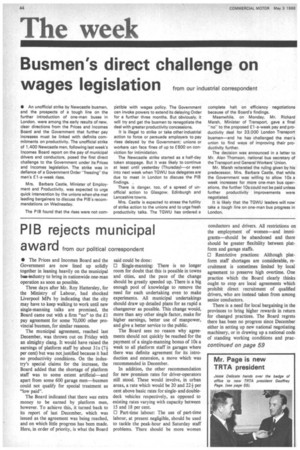1 3 113 rejects municipal award from our political correspondent
Page 46

If you've noticed an error in this article please click here to report it so we can fix it.
• The Prices and Incomes Board and the Government are now lined up solidly together in leaning heavily on the municipal bulk-industry to bring in nationwide one-man operation as soon as possible.
Three days after Mr. Roy Hatterstey, for the Ministry of Labour, had shocked Liverpool MPs by indicating that the city may have to keep walking to work until new single-manning talks are promised, the Board came out with a firm "no" to the pay agreement for some 70,000 other provincial busmen, for similar reasons.
The municipal agreement, reached last December, was thrown out on Friday with an almighty clang. It would have raised the earnings of platform staff by about 31s (7+ per cent) but was not justified because it had no productivity conditions. On the industry's special claims for the increase, the Board added that the shortage of platform staff was to some extent artificial—and apart from some 600 garage men—busmen could not qualify for special treatment as "low paid".
The Board indicated that there was extra money to be earned by platform men, however. To achieve this, it turned back to its report of last December, which was issued as the agreement was being reached, and on which little progress has been made. Here, in order of priority, is what the Board
said could be done: E Single-manning: There is no longer room for doubt that this is possible in towns and cities, and the pace of the change should be greatly speeded up. There is a big enough pool of knowledge to remove the need for each undertaking even to make experiments. All municipal undertakings should draw up detailed plans for as rapid a changeover as possible. This change would, more than any other single factor, make for higher earnings, better use of manpower, and give a better service to the public.
The Board sees no reason why agreements should not quickly be reached for the payment of a single-manning bonus of lOs a week to all platform staff in garages where there was definite agreement for its introduction and extension, a move which was recommended in December.
In addition, the other recommendation for new premium rates for driver-operators still stood. These would involve, in urban areas, a rate which would be 20 and 221per cent above basic rates for singleand doubledeck vehicles respectively, as opposed to existing rates varying with capacity between 15 and 18 per cent.
E Part-time labour: The use of part-time labour, at present negligible, should be used to tackle the peak-hour and Saturday staff problems. There should be more women
conductors and drivers. All restrictions on the employment of women—and immigrants—should be abandoned and there should be greater flexibility between platform and garage staffs.
El Restrictive practices: Although platform staff shortages are considerable, recruitment is sometimes limited by local agreement to preserve high overtime. One practice which the Board clearly thinks ought to stop are local agreements which prohibit direct recruitment of qualified drivers, who are instead taken from among senior conductors.
There is a need for local bargaining in the provinces to bring higher rewards in return for changed practices. The Board regrets there has been no progress since December either in setting up new national negotiating machinery, or in drawing up a national code of standing working conditions and prac continued on page 5,9




































































































































































































































